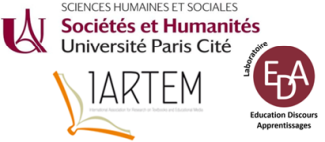Climate change learning materials are characterized by triple complexity, including factual complexity, ethical complexity, and linguistic complexity when presented in disciplinary, multimodal texts (Fuhlrott & Bordin, submitted 2024). These complexities pose challenges for students' reading competence, requiring appropriate didactic methods from teachers.
The research questions of this study are as follows:
- What are the specific reading competence requirements imposed by digital textbook chapters on climate change?
- How do the reading competence requirements of chapters on climate change in Germany's digital Grade 11 Geography textbooks differ from those of other chapters, such as endogenic forces?
The methodology employed in this research includes qualitative content analysis (Mayring, 2010) and quantitative data analysis methods using MAXQDA. The climate change chapters from three digital Grade 11 Geography textbooks in the German state of Nordrhein-Westfalen were selected for comparison (n=48 textbook pages). The analysis examined variates in the following categories and their correlations:
- The multimodality of the texts in the learning material, with a specific focus on the various text types presented.
- The requirements of the learning tasks given on the textbook page in regards to the requirements to select, organize, and integrate information from different text types.
- The amount and kind of instructional support given for the steps of the reading process in the phrasing of the tasks.
- The authenticity of the texts presented on climate change.
- The types of action verbs in learning tasks.
In a second step, specific reading competence challenges enhanced by the digital medium (Jian, 2022; Wylie et al., 2018) were also examined in a content analysis of selected double pages.
Preliminary results indicate that the digital textbook pages on climate change are linguistically complex. Students need to possess text type-specific reading competences for a variety of text types, which can be clustered into linear, graphic, graphically structured, mathematical, and short texts. These text type-specific reading competences often require competences from several disciplinary literacies (e.g., mathematical competences to read graphs or geographical competences for maps). Furthermore, students also need multimodal reading competence as they are required to select, organize, and integrate information from different text types through the tasks presented, particularly in larger elective project tasks found in two of the three textbooks' climate change chapters.
Regarding authenticity, chapters on climate change tend to employ more didactically composed or modified texts compared to other topics. Most texts do not provide source attribution, limiting students' ability to assess the reliability of the information presented.
The digital medium significantly impacts the reading competence requirements, particularly in terms of the visibility of complex, multidimensional texts such as concept maps, which need to be integrated with information from other texts. Moreover, the digital format introduces a wider range of text types to be considered compared to traditional print versions of textbooks.
In the discussion of the results, it is suggested that students not only require a range of text type-specific reading competences but also multimodal reading competence to comprehend and engage with climate change topics. Research indicates that solely training reading strategies or simplifying texts is ineffective in improving reading comprehension outcomes (Dittmar et al., 2017). Consequently, the paper presentation concludes with a suggestion for a didactic, task-based method to support the development of multimodal reading competence, as well as a research design for a pre-post study to investigate the effectiveness of this method.

 PDF version
PDF version
